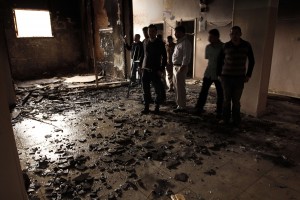
(AFP Photo)
The town of Al-Khosous saw its seventh death on Thursday as a result of recent sectarian violence, which started on 5 April. Saber Helal Saber, a 21-year-old resident, died of severe burns while in the hospital, according to state-owned Al-Ahram.
Criticism against the government’s handling of sectarian violence in Al-Khosous and St. Mark’s Cathedral continues to mount.
The most recent fatality came on the same day the Qaliubiya Security Directorate hosted the beginning of reconciliation meeting between Muslims and Christians in the town.
The Advisory Board of the Coptic Organisation, under the banner of “Copts under siege” called on the government to give in to nine demands that it claims will help rectify the current situation and prevent religious violence in the future.
“With the rise to power of the Muslim Brotherhood, Egyptian Copts are facing renewed and increased challenges in direct contradiction with the true Egyptian heritage that is built on diversity, tolerance, and traditions of harmony and participation of all Egyptians,” the group said in a statement.
“The sectarian strife plan was crowned by the blatant aggressions by security forces on St. Mark’s Cathedral, considered to be Egypt’s largest Christians symbol, joining other attackers strangely supporting and protecting them by firing live ammunition, tossing Molotov cocktails, as well as firing tear gas,” the group’s statement added.
A video was played at the press conference containing footage supporting the board’s claims, showing footage of tear gas being fired inside the cathedral complex and in front of the papal residence. Footage also showed plain-clothed civilians cooperating with security personnel in attacking those behind the complex walls.
The group’s first demand was “renewed respect for the rule of law.” It went on to demand the resignation of the Interior Minister, reform of the security apparatus, the appointment of an independent prosecutor general, and the “expedient conclusion” of all investigations of sectarian incidents starting with the bombing of All Saints Church in Alexandria.
It also called on the government to ban all forms of discrimination, the cleansing of all media and educational material of content derogatory of Christianity or inciting hatred against Christians, and a formal apology from the government for the actions taken by the interior ministry last Sunday.
The advisory board also demanded that the “fraudulent” statement by the president’s adviser for foreign relations Essam Haddad be withdrawn, accompanied by a formal apology for the claims made in that statement.
The Egyptian Initiative for Personal Rights (EIPR) published a report on Thursday examining the violence in Al-Khosous and the cathedral in Abbaseya between 5 and 7 April, also providing a background for sectarian history in the town north of Cairo, which the report says began in 1972 when a group of Christians were attacked. In 2008, police stormed the Coptic residences after a sectarian fight, arresting two men and five women. The church of Mar Mina in the town was attacked in January 2011.
The report went on to say that sectarian tensions had been escalating leading up to the most recent violence.
Human Rights Watch (HRW) also released a piece on Wednesday, calling on Egyptian authorities to investigate police failure in Al-Khosous and Abbaseya. By the organisation’s count, there have been at least five incidents of religious violence since the president took office last summer, with prosecutors only investigating unrest in Dahshur that resulted in approximately 100 Christian families fleeing.
HRW pointed to unequal building laws for mosques and churches, saying this also contributed to periodic tension between the communities.
